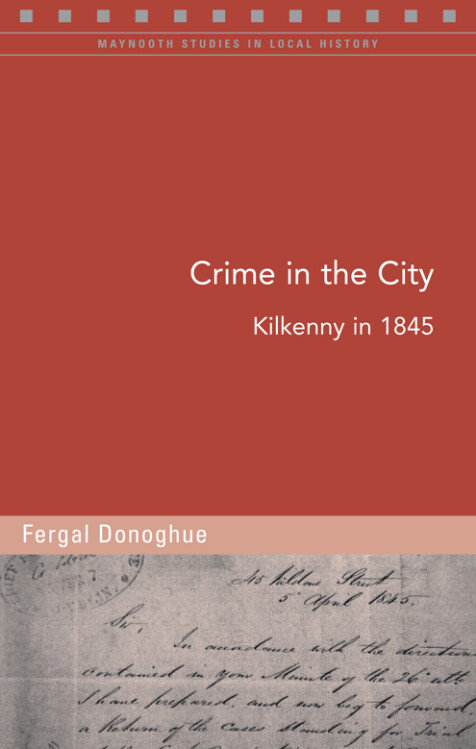Crime in the city
Kilkenny in 1845
Fergal Donoghue
‘Fergal Donoghue makes excellent use of census data together with parliamentary papers to reconstruct everyday life in the city before the Famine and the circumstances that led its inhabitants to crime’, Family & Community History (October 2016).
‘Typical of the high calibre of the [Maynooth Studies in Local History] series is Fergal Donoghue’s Crime in the City: Kilkenny in 1845. The book provides a fascinating insight into the nature and punishment of crime in Kilkenny city in 1845 … Overall this short book offers a fine contribution to not only our understanding of crime and punishment in Kilkenny city but also to the wider national history of this subject. In doing this the author provides a valuable insight into the motivations and fears of those responsible for the punishment in mid-nineteenth century Ireland’, Holinshed Revisited history blog (September 2015).
‘Fergal Donoghue offers insights into crime and sentencing by focusing on Kilkenny in 1845. He utilizes surviving sources to give an indication as to the class background of those before courts for various crimes as he reveals motivations for committing crime … Donoghue argues that the survival of sources made it possible for him to reconstruct forty-five cases with significant variations in sentences handed down’, Brian Casey, Irish Literary Supplement (Spring 2017).
‘The Maynooth Studies in Local History are one of the most significant publishing achievements in Irish History in the past quarter century … they are a triumphant demonstration of the value of the local approach [and] are illustrative, individually and severally, of the exemplary potential of the micro-study, and of the illuminative and illustrative quality of an approach that not just accommodates but provides a raison d’etre for a form of history that celebrates the diversity that underlies every generalisation that historians aspire to reach’, James Kelly, Studia Hibernica (2014).
‘The Maynooth Studies in Local History have brought about a quiet revolution in Irish local studies, and have changed the larger landscape too. Working from fascinating and little-known sources, and mobilizing the resources of energetic and imaginative scholarship, an extraordinary range of subjects has been identified, illuminated, and brought into focus. These 100 publications not only explore little-known local episodes and phenomena; they constitute a major contribution to the mainstream of Irish history’, R.F. Foster.

